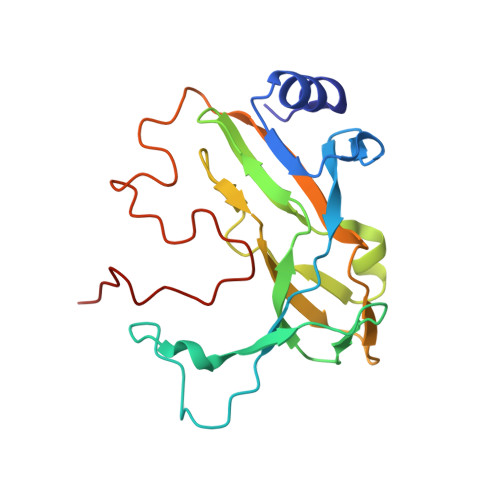Mechanism of dTTP inhibition of the bifunctional dCTP deaminase:dUTPase encoded by Mycobacterium tuberculosis.
Helt, S.S., Thymark, M., Harris, P., Aagaard, C., Dietrich, J., Larsen, S., Willemoes, M.(2008) J Mol Biology 376: 554-569
- PubMed: 18164314
- DOI: https://doi.org/10.1016/j.jmb.2007.11.099
- Primary Citation of Related Structures:
2QLP, 2QXX - PubMed Abstract:
Recombinant deoxycytidine triphosphate (dCTP) deaminase from Mycobacterium tuberculosis was produced in Escherichia coli and purified. The enzyme proved to be a bifunctional dCTP deaminase:deoxyuridine triphosphatase. As such, the M. tuberculosis enzyme is the second bifunctional enzyme to be characterised and provides evidence for bifunctionality of dCTP deaminase occurring outside the Archaea kingdom. A steady-state kinetic analysis revealed that the affinity for dCTP and deoxyuridine triphosphate as substrates for the synthesis of deoxyuridine monophosphate were very similar, a result that contrasts that obtained previously for the archaean Methanocaldococcus jannaschii enzyme, which showed approximately 10-fold lower affinity for deoxyuridine triphosphate than for dCTP. The crystal structures of the enzyme in complex with the inhibitor, thymidine triphosphate, and the apo form have been solved. Comparison of the two shows that upon binding of thymidine triphosphate, the disordered C-terminal arranges as a lid covering the active site, and the enzyme adapts an inactive conformation as a result of structural changes in the active site. In the inactive conformation dephosphorylation cannot take place due to the absence of a water molecule otherwise hydrogen-bonded to O2 of the alpha-phosphate.
- Department of Chemistry, Technical University of Denmark, Kemitorvet 207, DK-2800 Kgs. Lyngby, Denmark.
Organizational Affiliation:



















